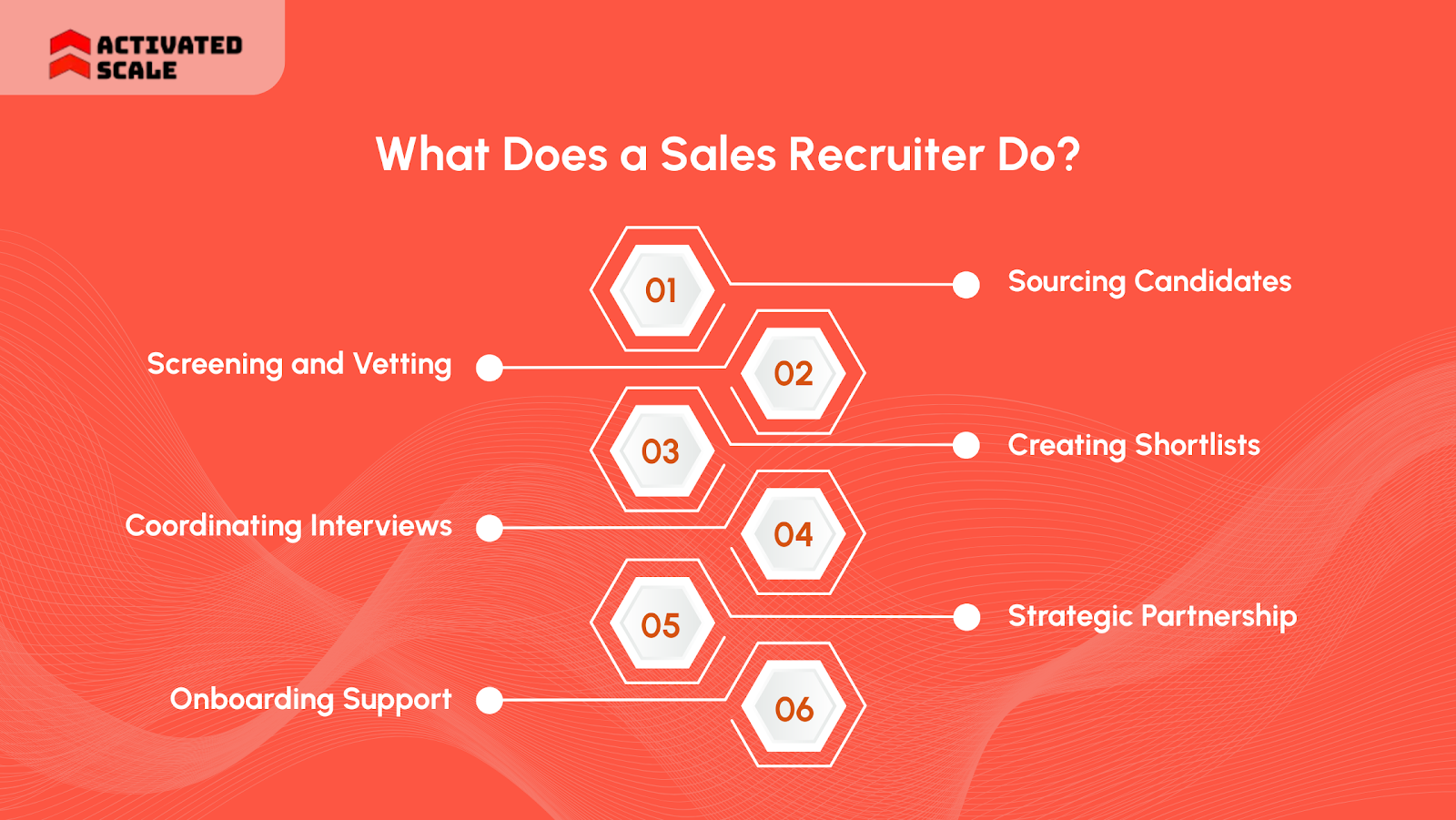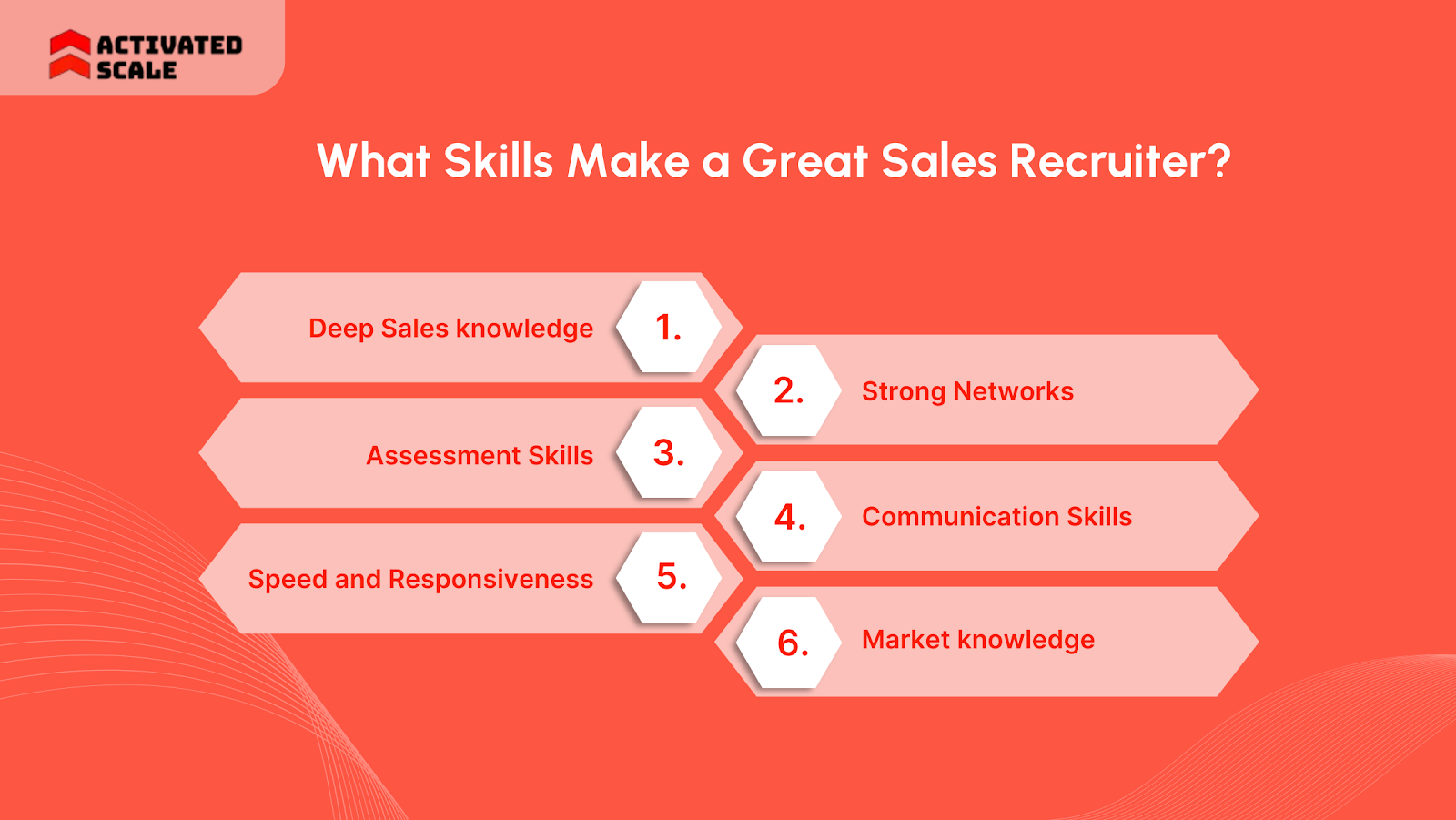Hiring sales talent shouldn't take months. But for most companies, it does. You post a job, sift through hundreds of resumes, conduct interview after interview, and still end up with candidates who look good on paper but can't close deals. In fact, according to industry data, a wrong hiring choice can cost a company about 30% of the employee’s first-year pay.
A sales recruiter solves these problems. They specialize in finding, vetting, and placing sales professionals with the right experience, skills, and proven track record. Instead of spending months searching, you connect with qualified candidates in days. Instead of taking hiring risks, you work with someone who has already done the work to ensure quality.
Let’s take a detailed look at what a sales recruiter is, how they work, why companies use them, and how they can help you build a sales team faster without the guesswork.
Key Takeaways
- Sales recruiters specialize only in sales roles, giving them deeper networks and better candidate assessment skills than general recruiters.
- Most sales recruiters present qualified candidates within 5-7 days instead of the 2-4 months traditional hiring takes.
- Recruiters access passive candidates who aren't actively looking for jobs but have more experience than typical applicants.
- Contract-to-hire and fractional models let you test a candidate's performance before committing to a full-time offer.
- Sales recruiters handle screening, interviews, and coordination so your team can focus on closing deals, not hiring.
What Is a Sales Recruiter?
A sales recruiter is a professional who specializes in finding, evaluating, and placing sales talent in companies. They focus exclusively on sales roles like Sales Development Representatives (SDRs), Account Executives (AEs), and VPs of Sales.
Unlike general recruiters who handle multiple job functions, sales recruiters know the sales industry inside and out. They know what skills matter, what experience translates to success, and how to assess whether a candidate can actually close deals.
For example, if you're a SaaS startup looking to hire an AE who has sold to mid-market companies at a $25K average contract value (ACV), a sales recruiter will find candidates who have done exactly that. They won't send you someone who only has experience with small business sales or a completely different sales cycle.
The main difference between a sales recruiter and a general recruiter is focus. Sales recruiters have deep networks in the sales world, access to passive candidates, and the ability to evaluate sales-specific skills like pipeline management, objection handling, and closing techniques.
Why Do Companies Use Sales Recruiters?

Companies use sales recruiters because traditional hiring doesn't work well for sales roles. Sales positions are hard to fill, expensive to get wrong, and critical to revenue growth. Here's why businesses turn to sales recruiters instead of handling hiring internally.
- Access to a wider talent pool: Sales recruiters have extensive networks that include passive candidates who aren't actively looking for jobs but would consider the right opportunity. These candidates often have more experience and are of a higher quality than those applying to job posts.
- Speed: Sales recruiters can fill roles in 5-7 days instead of the 2-4 months it takes to hire internally. For startups, this speed matters. Every week without a salesperson is lost revenue.
- Specialized expertise: Sales recruiters know what separates a mediocre sales hire from a great one. They can assess whether a candidate has the right experience selling to your buyer persona, at your ACV, and in your industry.
- Reduced hiring risk: Many sales recruiters offer contract-to-hire or fractional models. You can test a candidate's performance before making a full-time commitment. This reduces the risk of a bad hire that costs you six figures and months of lost productivity.
- Time savings: Recruiters handle resume screening, initial interviews, and candidate coordination. Your team can focus on closing deals instead of sitting in back-to-back interviews with unqualified candidates.
- Lower turnover: Sales has one of the highest turnover rates of any role. Sales recruiters place candidates who fit your company culture, sales process, and compensation structure, reducing the chance they'll leave after a few months.
Most companies can't afford to wait months for the right sales hire. Activated Scale connects you with vetted SDRs and AEs in under a week, so you can start booking meetings and closing deals faster. Book a call today to find the right sales talent for your team.
What Does a Sales Recruiter Do?

Sales recruiters handle every step of the hiring process, so you don't have to. Here's what that looks like in practice.
- Sourcing candidates: Sales recruiters actively search for qualified candidates through job boards, LinkedIn, candidate databases, and their personal networks. They also reach out to passive candidates who aren't actively job hunting but have the right experience.
- Screening and vetting: Once they find potential candidates, recruiters screen resumes and conduct initial interviews to assess experience, skills, and cultural fit. They evaluate whether a candidate has sold to similar buyers, worked with similar sales cycles, and achieved results that match your goals.
- Creating shortlists: After screening, recruiters create a shortlist of the most qualified candidates. You only interview the top 2-4 people instead of wading through dozens of resumes.
- Coordinating interviews: Sales recruiters schedule interviews, handle candidate communication, and guide candidates through the entire process. They make sure no one falls through the cracks and that the process moves quickly.
- Strategic partnership: Recruiters work with you to develop hiring strategies that match your stage and goals. They help you define what good looks like for each role and adjust their search based on your feedback.
- Onboarding support: Once a candidate accepts an offer, many sales recruiters assist with onboarding to make sure the new hire gets up to speed quickly.
How Do Sales Recruiters Get Paid?
Sales recruiters typically work on one of three payment models: contingency fees, retained fees, or subscription models. Here's a quick look at how each model works:
What Skills Make a Great Sales Recruiter?

Not all sales recruiters deliver the same results. The best ones combine industry knowledge with strong people skills. Here's what separates great sales recruiters:
- Deep sales knowledge: Great recruiters have worked in sales or recruited for sales roles for years. They know the difference between an order taker and a true hunter. They can spot a solid pipeline builder versus someone who just got lucky with inbound leads.
- Strong networks: The best recruiters have relationships with hundreds of sales professionals across different industries and company stages. They can tap into these networks to find passive candidates who aren't on job boards.
- Assessment skills: Great recruiters ask the right questions during screenings. They dig into quota attainment, sales cycle length, deal size, and how candidates handle objections. They don't just check boxes on a resume.
- Communication skills: Sales recruiters need to clearly explain your opportunity to candidates and communicate candidate strengths and weaknesses to you. They manage expectations on both sides.
- Speed and responsiveness: Top recruiters move fast. They respond to messages quickly, schedule interviews promptly, and keep the hiring process moving without delays.
- Market knowledge: Great recruiters know salary benchmarks, competitor hiring activity, and what top sales talent expects from employers. They give you realistic guidance on what it takes to win candidates.
Hire Top Pre-Vetted Sales Talent With Activated Scale
Sales recruiters help you hire faster. But what if you could skip the long-term commitment and test sales talent before hiring them full-time?
Activated Scale connects startups and businesses with vetted, experienced sales professionals who work fractionally or full-time. Instead of waiting months to find the right candidate, you can hire a fractional SDR, fractional AE, or VP of Sales in under a week. You test their performance, see results, and hire them full-time if they're a great fit.
Here's how Activated Scale works:
- Connect with vetted sales talent in 5-7 days: You describe your goals, and we match you with experienced sales professionals who have sold to your buyer at a similar ACV. Sometimes we match you within 48 hours.
- Hire fractionally or full-time: Start with a fractional sales professional working part-time for $3,500-$7,000 per month. Scale up to full-time or convert them to an employee when you're ready.
- Access to 300+ pre-vetted sales professionals: Our network includes SDRs, AEs, and VPs of Sales who have worked at top companies such as Salesforce, Oracle, Crunchbase, and more.
- No long-term risk: Test performance before making a full-time commitment. If someone isn't the right fit, we'll rematch you at no extra cost.
- Proven results: Our fractional SDRs book an average of 10-15 meetings per month. Our fractional AEs win $50K-$250K in new revenue per month. Over 80% of clients keep their sales talent for 5+ months, and 85% hire them full-time.
Ready to connect with experienced sales talent and start closing deals faster? Schedule a call today and find out how quickly you can scale your sales team.
FAQs
1. What's the difference between a sales recruiter and a staffing agency?
Sales recruiters specialize exclusively in sales roles and focus on finding candidates with specific sales experience and skills. Staffing agencies handle multiple job functions and typically place candidates in temporary or contract roles without the same level of sales expertise.
2. Do sales recruiters only work with large companies?
No, many sales recruiters work with startups and small businesses. Fractional models are especially popular with early-stage companies that need experienced sales talent but can't afford full-time salaries yet.
3. How do I know if a sales recruiter is finding quality candidates?
Ask about their vetting process, screening criteria, and success metrics. Quality recruiters will show you placement success rates, average tenure of hires, and performance data from past placements.
4. Can I hire a sales recruiter's candidate as a full-time employee later?
Yes, many recruiters offer contract-to-hire models. You start with a fractional or contract arrangement and convert the candidate to a full-time employee once you've tested their performance.
5. What types of sales roles can a sales recruiter fill?
Sales recruiters can fill SDRs, BDRs, Account Executives, Account Managers, Sales Engineers, VPs of Sales, and other sales leadership roles. Most specialize in specific role types or industries to provide better candidate matches.
The Ultimate Guide to Hiring a Salesperson!
Get the step-by-step guide to hiring, onboarding, and ensuring success!
_edi.png)




